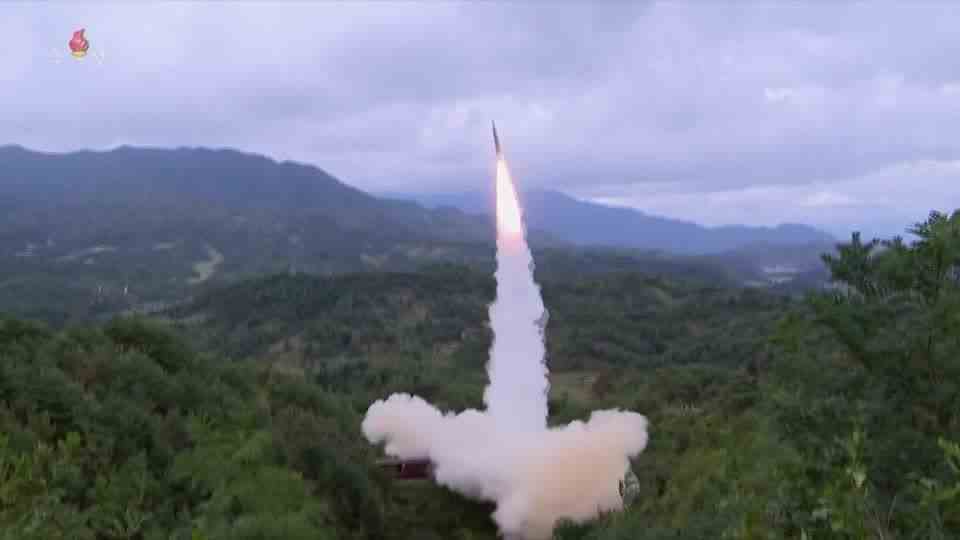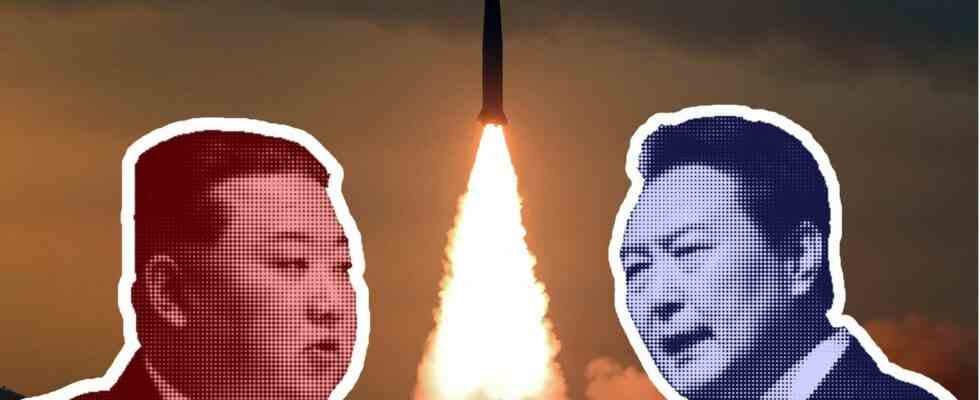analysis
conflict
North Korea’s wartime behavior has South Korea considering its own nuclear bombs. It could endanger the security of East Asia
Kim Jong Un (l.) Missile tests are causing South Korea great concern. That’s why South Korean President Yoon Suk Yeoul (right) is considering having his own nuclear weapons.
© Yonhap/KCNA via KNS/AFP
North Korea’s missile tests and nuclear threats are worrying South Koreans. So much so that the South Korean president is considering developing his own nuclear weapons — that would push the entire region into an arms race.
When Kim Jong Un fires another missile in North Korea, he simultaneously fires a signal to the world. A signal that demands attention and says: We are here and we are dangerous.
Every projectile from the north, every nuclear threat, increases concerns in South Korea about a hot war in which nuclear weapons are also used. In fact, the two Korean states are technically still at war; the Korean War ended in 1953 only with an armistice agreement, not a peace treaty. Hardly any country in the world is as threatened by nuclear weapons as South Korea.
But people there are increasingly fed up with Kim’s nuclear saber-rattling. So much so that South Korean President Yoon Suk Yeoul is considering that his country make their own nuclear weapons should – or the US should station such again in the country. In doing so, he initiated a once unthinkable debate.
South Korea has doubts about the USA as a protecting power
His words should fall on fertile ground among the population. Several Survey show that around 70 percent of South Koreans support their country’s nuclear armament.
According to Yoon, however, Seoul was quickly reassured that existing treaties and agreements, such as the Nuclear Non-Proliferation Treaty, would be adhered to. In addition, both Koreas have an agreement in 1992 signed a pledge not to develop, test or use nuclear weapons.
Nevertheless, in the south of the Korean peninsula, people are no longer sure if they are safe. The stability and intensity of the relationship with the important partner and protecting power USA are increasingly being called into question. Some in Seoul think it needs to be strengthened to keep North Korea in check – preferably with stationed US nuclear weapons. Yoon’s nuclear mind games could put pressure on Washington.
73rd anniversary
North Korea celebrates its birthday with tractors and fire brigades – instead of tanks and missiles
South Korean nuclear bomb could trigger domino effect
However, should North Korea continue to fire missiles or even carry out a nuclear test, the pressure on Yoon to act is likely to increase. And the South Korean nuclear bomb should be an obvious solution for him, because all previous efforts to persuade North Korea to disarm have failed: North Korea is a nuclear power, is expanding its arsenal and is threatening not only the South with a nuclear strike, but also the USA .
However, a nuclear-armed South Korea would have serious consequences for the East Asian region.
If South Korea actually pulls out of the nuclear non-proliferation treaty, it could trigger a kind of domino effect in the region: In Japan, it could trigger a debate about its own nuclear weapons. The government in Tokyo has already initiated a massive rearmament of what is actually a pacifist state. And if Japan thinks about the bomb, then so could China-threatened Taiwan. If several states in the region are considering acquiring nuclear weapons, North Korea will be careful not to end its nuclear weapons program. A denuclearization of the Korean peninsula would be even more distant. A first strike by North Korea against its neighbor to the south could no longer be ruled out.

China could interfere
Speaking of China: Beijing could also intensify its nuclear program again, although it actually has no interest in an arms race in its sphere.
On the other hand, China could put pressure on Pyongyang precisely in order not to force South Korea to act and to keep rearmament in East Asia to a minimum.
All just possibilities. It is also conceivable that a South Korean nuclear arsenal could deter North Korea and bring it back to the negotiating table. China could then become more involved again in problems related to North Korea.
South Korean President Yoon assured butthat you want to remain in the Nuclear Non-Proliferation Treaty. Yet.
Should he pull South Korea out of the treaties, it wouldn’t be a big deal. In an estimated twelve months could the country arm itself with nuclear weapons after exiting the nuclear non-proliferation treaty. And South Korea shouldn’t feel bound by the bilateral treaty with North Korea from ’92 anyway – the North broke the treaty a long time ago with its first nuclear test in 2006.
The Cold War muff
A South Korean withdrawal would also have consequences for the United States that would be close to a loss of face. Even if Washington does not want South Korean nuclear weapons, imposing sanctions on Seoul would be diplomatic double standards. After all, the USA is not doing this with the de facto nuclear powers Israel, Pakistan or India. It would also undermine the US role as a protecting power in South Korea and Japan.
If both North and South Korea have nuclear weapons, an arms race reminiscent of the tense times of the Cold War would ensue. Fortunately, there was never a nuclear war between NATO and the Warsaw Pact. But too often the world was on the verge of it.
History would repeat itself with two nuclear-armed Korean states: communism versus democracy and the constant fear of one pressing the red button.
Sources: “The New York Times”, Yonhap News Agency, Ministry of Foreign Affairs South Korea, Australian National University, Council on Foreign Relations, “The Diplomate”, Voice of America, “Foreign Policy”, Sky News Australia, OFAC, U.S. Department of State


